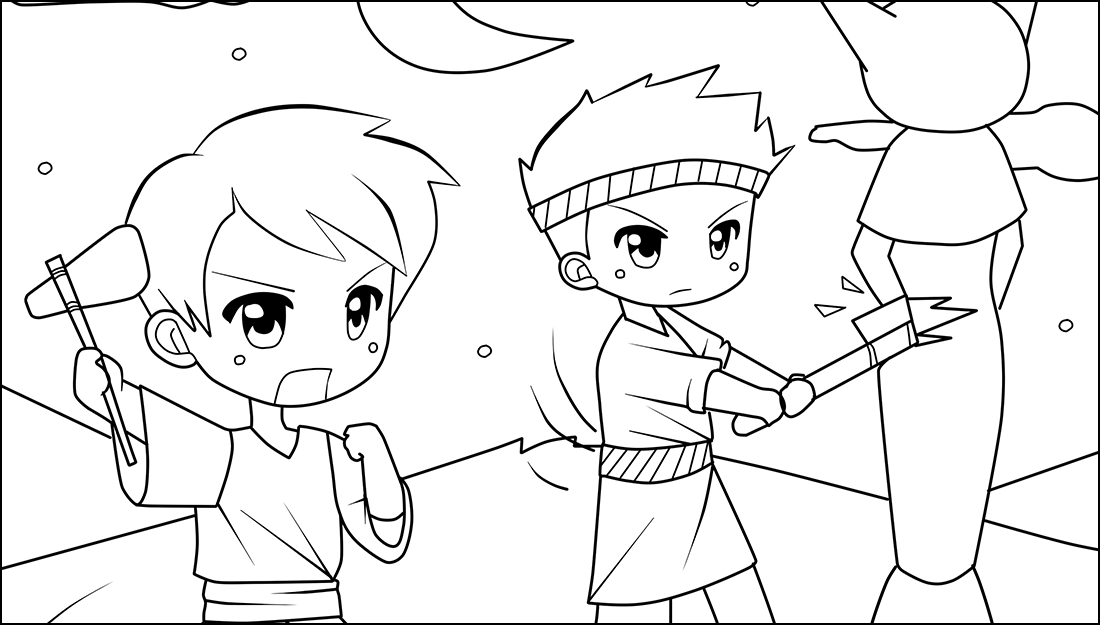Gideon’s people were in trouble, and Gideon didn’t think he could do anything about it. Until an unexpected Visitor gave him a special job.

PDF to print for family reading
(The following story is found in Judges 6.)
Gideon beat his meager harvest of wheat stalks with a large stick. As he did, precious kernels of ripe grain fell to the ground. His workspace was cramped. He was in a hole in the ground that normally served as the family winepress.
It would have been easier to work in an open area, but that was just too visible. Here at least he was somewhat protected. Surely he was hidden enough to gather their vital food, unseen. His clan was hungry.
Marauding Midianites
Occasionally Gideon stopped, squinting into the distance. He searched for any sign of movement signaling the invasion of the dreaded Midianites. For seven years they had come at harvest time to rob the land of its food and livestock. Then they moved on.
Every year Israel’s plight grew more desperate.
God or god—whom will you fear?
Seven years, Gideon thought bitterly. How much longer will this go on? How much longer would they have to hide, desperate for food and relief? How long would they be oppressed by those wretched Midianites?
Israel had cried out for deliverance, and God sent a prophet with a message: “I delivered you out of the hand … of all who oppressed you … and gave you their land. Also I said to you, ‘I am the LORD your God; do not fear the gods of the Amorites, in whose land you dwell.’ But you have not obeyed My voice” (Judges 6:9-10).
Why wouldn’t the people listen to God’s correction?
An unexpected Visitor
There was a huge oak tree near the winepress. Under its shade sat an unexpected Visitor, silently watching Gideon as he toiled. Then He spoke: “The LORD is with you, you mighty man of valor!” (verse 12).
“If the LORD is with us, why then has all this happened to us?” Gideon responded glumly. “Where are all His miracles?” Gideon knew well how God brought Israel out of Egypt, but now it seemed He had forsaken them.
The Visitor’s answer was puzzling: “Go in this might of yours, and you shall save Israel. … Have I not sent you?”
How could this be? Gideon didn’t think he or his family was important. He didn’t see how he could save Israel.
But the LORD continued, “Surely I will be with you, and you will defeat the Midianites.”
Who are You, exactly?
There was something different about this Visitor, and Gideon had his suspicions. “If now I have found favor in Your sight, then show me a sign that it is You who talk with me,” he said cautiously. Then he asked the Visitor to wait while he got an offering to give Him. Gideon hurried away to prepare a young goat and some unleavened bread—just in case this stranger was indeed who Gideon thought He was.
When Gideon presented his offering, the Visitor said, “Take the meat and the unleavened bread and lay them on this rock, and pour out the broth.”
Gideon moved quickly to obey. He watched in shocked silence as the Visitor touched the offering with the tip of His staff, and ZING! Fire leapt out of the rock and burned up the meat and bread. And the Visitor disappeared … into thin air!
Oh no!
Gideon, terrified and fearing for his very life, cried, “Alas, O Lord GOD! For I have seen the Angel of the LORD face to face.”
“Then the LORD said to him, ‘Peace be with you; do not fear, you shall not die.’”
Relief filled Gideon. He hurried to build an altar to the LORD. In his gratitude he called it The-LORD-is-Peace.
First things first
Gideon worshipped the LORD God of Israel—unlike his father, Joash, and most of his clan. Joash worshipped Baal, and the community high place with its altar and image dedicated to Baal was on his land.
The LORD gave Gideon his first assignment. That altar and the wooden image standing beside it must be destroyed.
The LORD’s instructions were precise: Take a seven-year-old bull and Joash’s young bull and use them to topple the altar. Then cut down the dreadful image. Gideon couldn’t do this by himself, but he had 10 servants he could trust to help destroy everything relating to Baal.
By cover of night
Gideon knew such an act was full of danger—life-threatening, even—if they were discovered. So, under cover of night, he and his men worked feverishly to demolish the high place. They replaced it with a proper altar to God. They built a fire using the wooden image, slaughtered the seven-year-old bull and offered it as a fitting sacrifice to God.
The next morning it didn’t take long for someone to notice what had happened. In short order everyone agreed that Gideon, the son of Joash, had done this thing. He must die!
A change of heart?
Gideon’s father worshipped Baal, but he was moved by his son’s courage. He reasoned with the angry crowd. If Baal has been offended and if he truly is a god, then let Baal punish the offender. And, he added, if anyone decides to act on Baal’s behalf and kill Gideon, that person should be put to death instead (6:31). The people were quieted by his words, and his son’s life was spared.
From then on Joash called his son Jerubbaal—one who contended with Baal and lived.
Meanwhile at the border
“It’s the Midianites and Amalekites! They’re coming!” the watchman shouted. In years past, the Israelites were helpless to stand and face these intruders. But this time, the Spirit of the LORD came on Gideon, and things were going to be different.
Sound the alarm
Gideon blew the trumpet to sound the alarm, and his family was the first to respond, ready for action. “Send runners to Manasseh, Asher, Zebulun and Naphtali [neighboring tribes of Israel] and tell them to come armed for battle!” he ordered.
The Midianites were about to meet their match, and not in any way they could have expected.
Discussion questions
1. Which commandments did Israel break by worshipping Baal?
2. Why do you think everyone immediately thought Gideon destroyed the high place dedicated to Baal?
3. Why do you suppose Joash saved Gideon from death at the hands of an angry mob?
If you would like to learn more about the Angel of the LORD, see our article “The Angel of the LORD.”
For an overview of the book of Judges, see our article “Book of Judges.”





